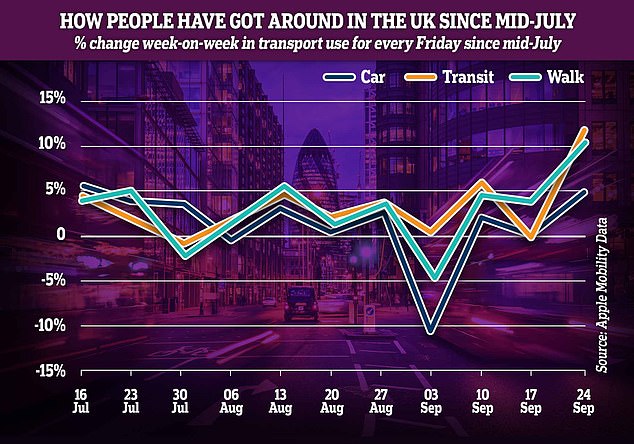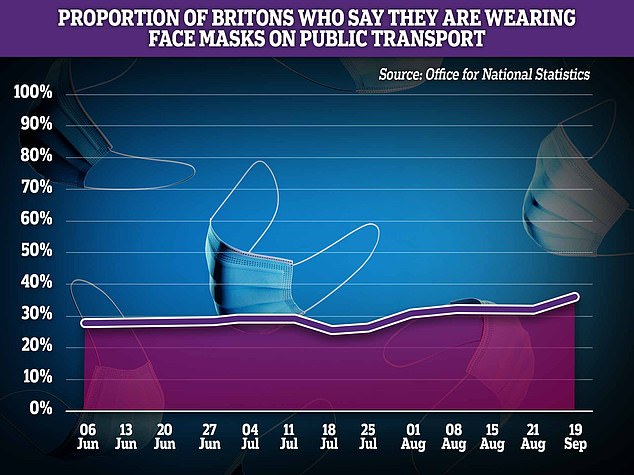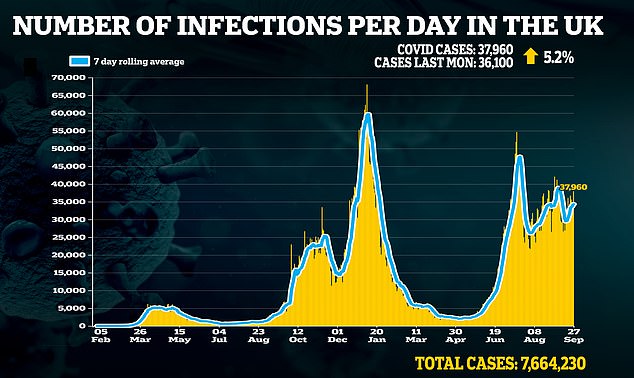Britain’s petrol crisis could drive up Covid cases if commuters rush back onto buses and trains, experts said today amid fears the country is on the cusp of a fourth wave.
Professor Paul Hunter, an epidemiologist at the University of East Anglia, claimed there could ‘certainly’ be a spike as a result of the fuel shortage. Other scientists said it was ‘plausible’.
Hundreds of forecourts across the country have already been run dry by panic buyers, which it’s thought may lead to a sudden clamour for public transport.
Shocking footage showed drivers throwing punches and even brandishing knives during chaotic scenes at petrol stations on Monday.
Doctors and nurses have demanded they are given priority for fuel, saying they need to be able to get to hospitals to treat patients.
Professor Hunter told MailOnline: ‘The move to public transport could certainly increase transmission. And, if the majority of people are not wearing face coverings, then that would make that transmission worse.’
SAGE has previously warned that if commuter levels suddenly return to pre-pandemic levels then it could fuel a fresh wave.
Covid cases in England and Wales are currently heading upwards, in what scientists believe is the result of millions of children returning to school at the start of September.
Scotland suffered a meteoric rise in infections after classrooms reopened in mid-August. And although rising infections were previously focused among children, official data now suggests they are starting to spill over into their parents.

Hundreds of forecourts across the country have already run dry amid queues into the early hours and fights at garages (Pictured: Petrol station in Clapham, London)

Drivers have been pictured queuing for fuel at petrol stations (Pictured: Wisley South Services in Surrey today. The local council is considering declaring an emergency)

Are Britons turning to public transport? The above graph shows the weekly percentage change in the number of people using cars, transit or walking on each Friday since mid-July compared to the previous Friday. It reveals that there has been a surge in the number of people taking transit and walking amid the petrol crisis. There is also a rise in the number of drivers

Almost two thirds of Britons are not wearing face masks on public transport, figures from surveys by the Office for National Statistics show
Experts have always warned Britain will likely be struck by a fourth wave later this year, similar to the spike in cases last September when schools went back.
Public transport can be a hotbed for the virus because of a lack of social distancing and ventilation.
Professor Jonathan Stoye, a virologist at the Francis Crick Institute, claimed it was ‘plausible’ the fuel crisis could spark more Covid cases.
But he also insisted any impact was likely to be ‘relatively minor’. This is likely due to vaccinations and the back-to-work drive.
Professor Stoye told MailOnline: ‘Definitive attribution to the fuel situation will be especially difficult if, as seems likely, supplies start to flow more freely in the near future.
How can I carry fuel legally from a petrol station – and can I store it at home? 
A motorist fills up her vehicle with fuel from a jerry can at a petrol station in London today
What containers can I use to store petrol?
The legislation allows you to store petrol in the following containers:
plastic containers storing up to 10 litresmetal containers storing up to 20 litresdemountable fuel tank up to 30 litres
Suitable portable containers are defined as being ‘robust’, ‘will not significantly degrade due to exposure to petrol’ and must be marked with the words ‘PETROL’ and ‘HIGHLY FLAMMABLE’. If it is plastic it must be made of a moulded polyethylene.
Does the petrol in the fuel tank of my car count towards the total I can store?
No – the petrol in the fuel tank of your vehicle, including boats and aircraft, does not count when you are calculating the total amount you are storing.
How much petrol can I store in a vehicle?
You can store up to 30 litres of petrol in a maximum of 2 suitable containers in your vehicle.
How to store fuel at home?
The Health and Safety Executive says you can legally store 30 litres of petrol at your home but there are strict guidelines about how and where you should put it, because fuel is highly flammable.
It must be kept in:
a) in a shed
b) in a garage
c) Outside no more than six metres from your house – ie, at the end of a drive.
But officials at the AA recommend people that they ‘shouldn’t even contemplate storing it at all’.
Advertisement
‘Hopefully, most people will continue to show common sense regarding the wearing of masks in crowded or confined spaces.’
Professor David Livermore, a microbiologist at the University of East Anglia, also said it was ‘plausible’ that more people heading to public transport could spark an uptick in Covid cases.
Britain’s fuel crisis showed no sign of abating today as drivers sat in queues through the night in a desperate bid to get petrol.
At one London forecourt tensions boiled over with a motorist seen brandishing what appeared to be a knife at fellow drives.
And such is the panic at pumps, hundreds more people than usual have been filling up with the wrong fuel.
Around 250 flustered drivers were rescued by the AA’s specialist team on Saturday and Sunday — compared to around 20 in normal circumstances.
One tanker driver told LBC News that even they were struggling for fuel because they were spending so much time in queues with drivers also blocking access to HGV pumps.
Boris Johnson has been urged to stop ‘hiding away’ and address the nation over the crisis, like Tony Blair did in 2000.
Transport Secretary Grant Shapps today claimed the pressure on filling stations was beginning to ease and insisted the army remained on standby if needed.
Plans to have soldiers delivering fuel to beleagured forecourts were mooted, but quickly shelved by the Prime Minister.
Amid the shortage, Apple mobility data suggests more Britons are turning to public transport to get around.
Figures for last Friday showed the number of Britons taking transit to get around rose 11 per cent compared to the same time last week.
This was the sharpest uptick in weeks, and was far above the previous two Fridays when transport use rose by zero and six per cent.
Car use also rose last Friday, up by 4.7 per cent in a week. For comparison, on the previous two Fridays it rose by 0.2 and 2.1 per cent in seven days.
Office for National Statistics figures say almost two thirds of Britons do not wear face masks when they are on public transport.
They are no longer mandatory in England, although many transport operators still ask passengers to wear them. In Scotland, Wales and Northern Ireland people are told to wear the coverings on public transport.
Britain’s daily Covid cases are rising in a suspected back-to-school wave, after children went back in England, Wales and Northern Ireland.
Department of Health bosses yesterday recorded 37,960 cases, up 5.2 per cent in a week in yet another sign that the country may be approaching a fourth wave.
It marked the tenth day in a row that infections have risen week-on-week.
A breakdown of the figures by age groups shows cases are spiralling among children, especially 10 to 14-year-olds.
But there are also signs these infections are now spilling over into parents.
Experts warned yesterday that this group would be travelling to offices and social events, spreading the virus into the rest of society.
SAGE had always warned of a fresh wave after the return of schools, where the majority are not vaccinated. In the worst-hit parts of the country, up to one in 24 children tested positive last week alone.

Scientists say the rise in adults might be the result of millions more Britons returning to offices this month, following the end of work from home guidance.
Mr Johnson is relying on vaccinations for 12 to 15-year-olds and booster shots for the over-50s to keep a lid on the virus this winter.
But should the NHS come under unsustainable pressure he has said that some measures such as face masks will be brought back.
His scientific advisers have warned the country may need to go harder and faster to put the virus back into its box.
Source link : https://www.dailymail.co.uk/news/article-10033385/Petrol-crisis-cause-spike-Covid-cases-commuters-public-transport-experts-warn.html











